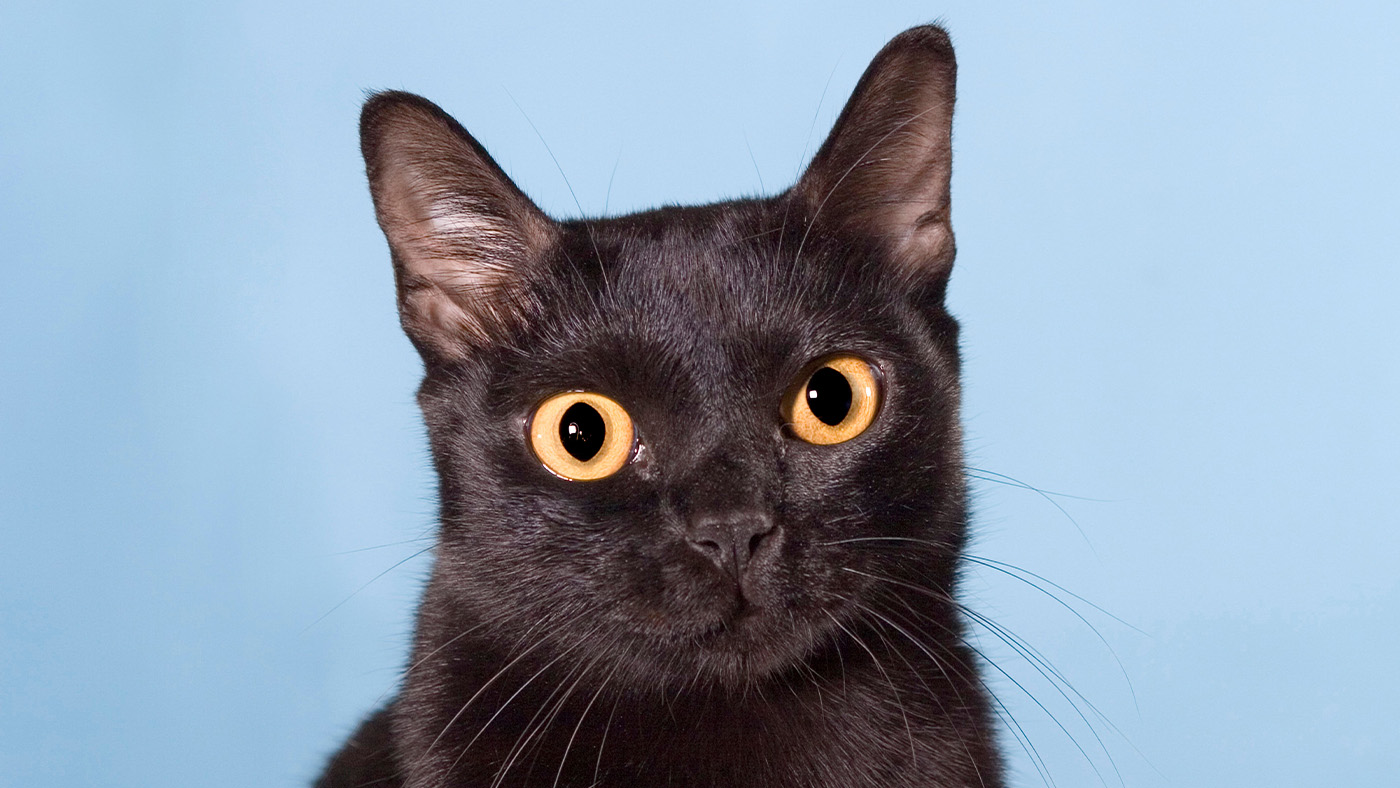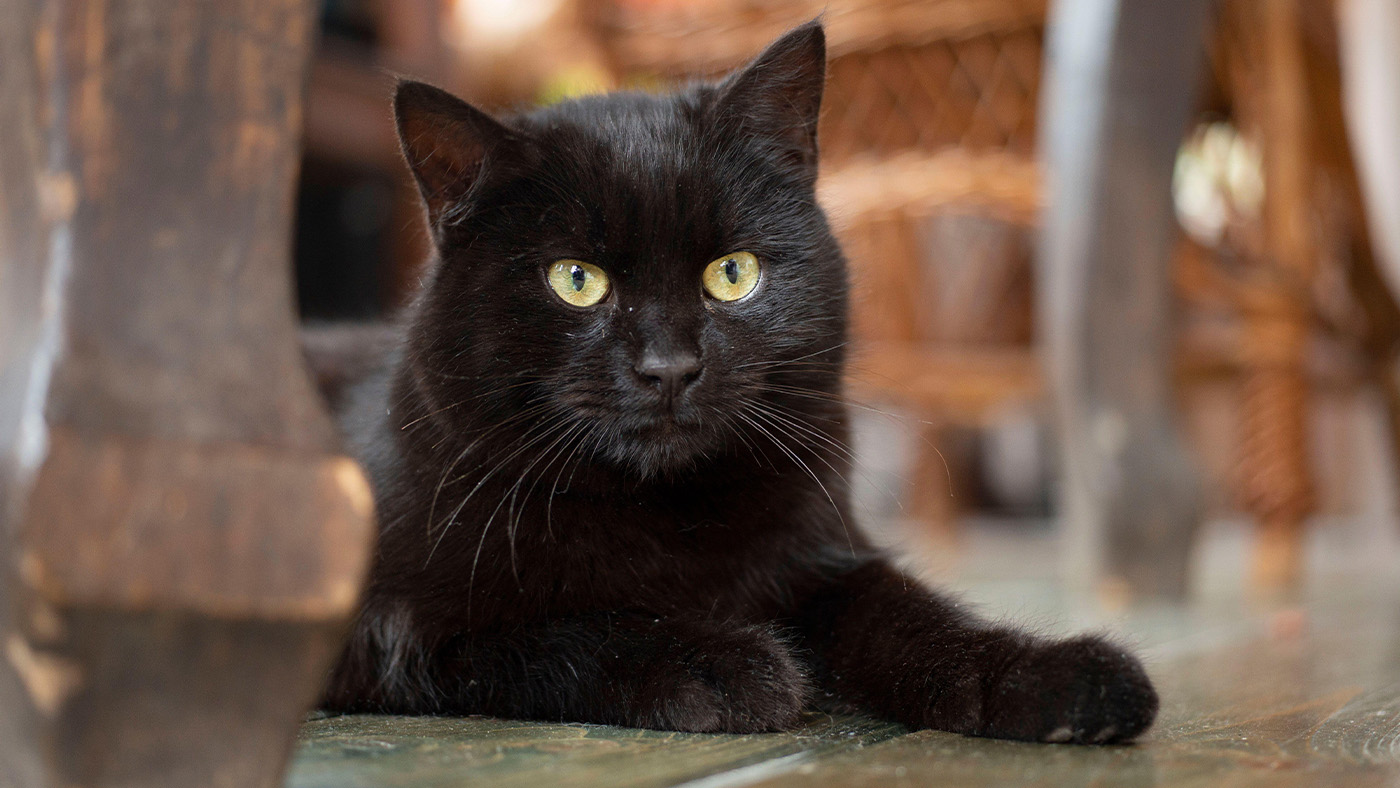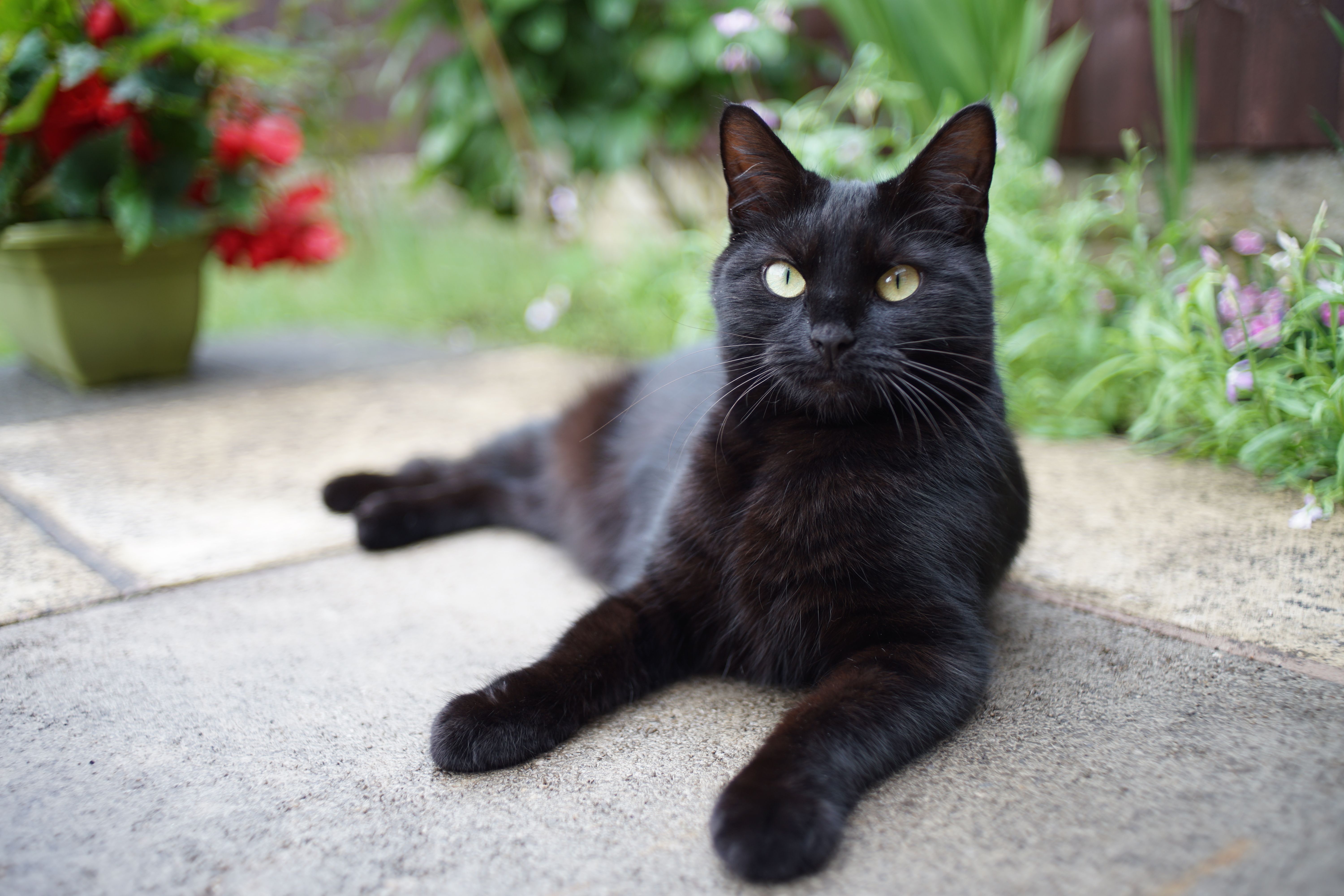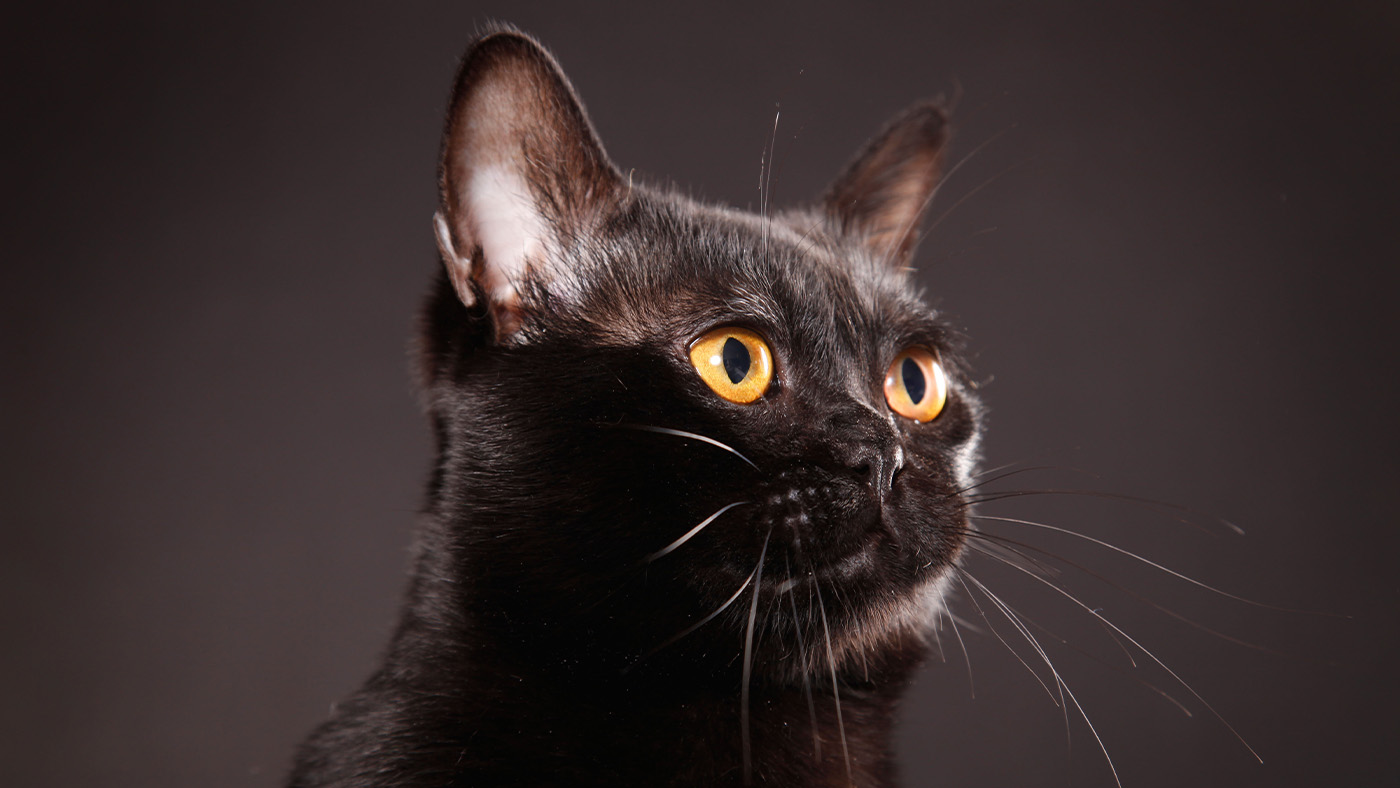The rare Bombay cat is like a mini ‘black panther’ that thrives on attention
Known for its jet black coat, the Bombay cat is rare, so it’s a real treat if you can track one down

Get the best advice, tips and top tech for your beloved Pets
You are now subscribed
Your newsletter sign-up was successful

Other names: mini black panther or parlor panther
Life expectancy: 12–20 years
Size: 6–11 lbs and 11–14 inches in height
Coat: jet-black coat with a glossy shine
Eye colour: golden and copper-colored eyes
Temperament: calm, even-tempered, fun-loving and friendly
Origin/native country: Louisville, Kentucky
The jury’s still out on whether black cats, like the beautiful Bombay, are lucky or unlucky. But what we are certain of is that these glossy-haired black beauties are one of the best cat breeds for first-time owners – and for good reason.
Trainable, outgoing and smart, these easy-going fur friends are sociable creatures, so they will thrive in the company of others. Despite the name, Bombay cats were bred in Kentucky after breeder Nikki Horner decided to cross a black American Shorthair with a Burmese to create a feline friend that resembled a mini black panther. A Bombay gets its name because of the location where you could historically find a panther.
To discover whether this attention-loving jet-black cat is right for your home, keep reading. We spoke to vet Dr Rebcca MacMillian, who gave us the low down on everything potential owners need to know.
Are Bombay cats rare?
Yes, just like the Savannah, Scottish Fold and Devon Rex, Bombay cats are scarce. Therefore, they are known as one of the rarest cat breeds in the world.
“With not many registered breeders around, Bombay cats are considered rare,” Dr MacMillan confirms. “This also means there is usually a waiting list if you want to purchase one.”
Are Bombay cats hypoallergenic?
The Bombay is considered a low-shedding breed, so this makes them more hypoallergenic than some other cats like a British Shorthair, Siamese, Himalayan or Maine Coon.
However, no breed of cat can be totally hypoallergenic.
Get the best advice, tips and top tech for your beloved Pets
“Just remember that all cats produce a protein in their saliva that can trigger reactions in sensitive humans,” Dr MacMillian warns. “This saliva is spread through their coat when they lick and groom themselves. So, any cat could cause allergy symptoms in sufferers, including the Bombay.”
If you do suffer from allergies, it’s worth reading up on the “hypoallergenic” cat breeds for those allergic to cats.

How much grooming does a Bombay cat need?
Coming with short-haired coats, Bombay cats have minimal grooming needs. Therefore, like most other cat breeds, they will need grooming weekly with one of the best cat brushes to keep their glossy black coats as polished as can be.
What exercise needs does a Bombay cat have?
Bombays are often named 'Velcro cats' because they are energetic creatures who love sticking by their owner's side.
But while they might follow you from one room to the other, they will still require around 30 minutes of exercise every day, which can be split into a few shorter play sessions.
“The Bombay is intelligent and will enjoy plenty of mental stimulation, as well as physical exercise," Dr MacMillan says. "Training sessions can be a great way of doing this, Bombay’s are relatively trainable compared to other breeds.”
Therefore, if you are thinking of bringing this kitty home, it’s worth investing in some of the best toys for indoor cats. The same can be said for the best automated cat toys, because these cats are very social and thrive in the company of their human counterparts. Doing so will mean they will be kept entertained, even if you aren’t around for an hour or two.
Either way, these curious cats will make their own fun if they get bored. So, as they are one of the more trainable cat breeds, you could always try some clicker training or teaching them tricks.

Are Bombay cats pretty healthy?
The good news is that Bombay cats are a generally healthy cat breed.
“A Bombay originates from a cross between the American Shorthair and the Burmese, so it benefits from some hybrid vigor,” Dr MacMillian says. “Many of the conditions that commonly affect Bombay cats can affect the feline population generally, such as obesity and dental disease.”
However, the vet notes that a Bombay cat does seem prone to hypertrophic cardiomyopathy (HCM).
“This genetic heart complaint causes thickening of the heart muscle, often leading to heart failure,” explains Dr MacMillian. “They also have a short nose compared to some other breeds, which can cause respiratory issues.”
To keep your Bombay cat healthy, you must purchase them from a reputable breeder who only mates healthy cats.
“This may mean waiting for your kitten, as there are few licensed breeders around for this breed,” Dr MacMillian says.
You must also take them for regular vet checkups and ensure they receive all of the recommended preventive care such as vaccinations, anti-parasite treatment, and neutering.
“A good quality complete diet that is appropriate for your cat’s life stage is also essential,” Dr MacMillian says. “Their food needs to be weighed out accurately to avoid obesity, which could worsen any underlying heart or respiratory complaints.”
Wisdom Panel Cat DNA Test | Amazon
Not sure exactly what breed your cat is? This kit screens for 70+ breeds, 45 genetic health insights and 25+ physical traits – because knowing every detail about your cat helps you understand how best to care for them.
How much does Bombay cats cost?
If you’ve got your eyes set on this black cat, generally speaking, prices for these elegant and glossy-coated cats tend to be between $500–700. But if you head to a from the best breeders, prices can reach up to $2,000.
This makes the Bombay one of the most expensive cat breeds.
Should I get a Bombay cat?
That depends on a few things. For starters, a Bombay cat is best suited to owners who will be home most of the day and can give them the attention they desire.
That’s because these cats are very sociable and enjoy human companionship.
Bombay cats would also suit households who are looking for an active breed, because many people report that their Bombay acts more like a dog than a cat!
Therefore, Dr MacMillian says: “This cat’s very sociable and playful nature makes them suitable for most households, as long as you don’t travel regularly or plan to leave them on their own.”
Taking Care Of A Bombay Cat | Amazon
This book is one of three parts that cover raising, training and taking care of Bombay cats specifically.
Read next: Bewitching black cat facts

Having graduated in 2009 from the Royal Veterinary College in London as a veterinary surgeon, Rebecca is highly experienced in first opinion small animal practice, having done a mixture of day-to-day routine work, on-call emergency duties and managerial roles over the years. Rebecca recently achieved a BSAVA postgraduate certificate in small animal medicine (with commendation).
Rebecca writes on various feline and canine topics, including behavior, nutrition, and health. Outside of work and writing she enjoys walking her own dog, spending time with her young family and baking!
Edited by Georgia Guerin.
This feature was last updated in May 2025 by Becks Shepherd.

Becks Shepherd is a lifestyle journalist who has worked with titles such as Tom's Guide, Marie Claire, and Fit and Well.
In addition to this, she’s a pet writer with nearly a decade of editorial experience across digital and print media. A devoted “dog aunt” and lifelong animal lover, Becks brings a personal touch to her pet content—whether she’s testing the latest dog gear or digging into behavioral tips.
She works closely with veterinary experts to ensure factual accuracy and is currently exploring animal care certifications to deepen her knowledge. Her work has appeared in leading outlets across health, wellness, and pet care spaces.


